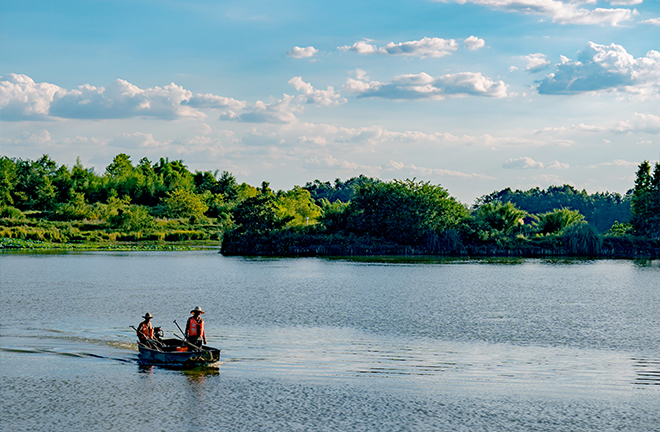Promoting modernization of harmony between humanity and nature

Workers keep the lake clean in Chongqing Municipality, Aug. 12. Photo: CFP
The 20th CPC National Congress report highlighted that, “respecting, adapting to, and protecting nature is essential for building China into a modern socialist country in all respects. We must uphold and act on the principle that lucid waters and lush mountains are invaluable assets, and we must remember to maintain harmony between humanity and nature when planning our development.”
The ecological environment provides the basic conditions for human survival and development. A civilization may thrive if its eco-environment thrives. Since the 18th CPC National Congress, China has witnessed historic, transformative, and comprehensive changes in ecological and environmental protection.
In the new journey of building a modern socialist country in all respects, it is absolutely necessary to pursue the path of development that puts ecosystems first and features green, low-carbon development. Institutions and systems should be improved to support ecological progress and promote modernization with harmony between humanity and nature.
The rational development and utilization of natural resources requires careful coordination. First, the relationship between economic development and environmental protection should be properly managed, and the reformation of resource allocation should be accelerated. Second, usage regulation of natural resources should be strengthened, and paid use of natural resources should be implemented. Third, development of main functional zones should be accelerated, ecosystem functions should be improved, and the value of ecosystem services should be enhanced.
In the effort to prevent and control pollution, we must first control both the total amount and intensity of carbon emissions as an active response to climate change. Second, we should improve fiscal, taxation, investment, and financial policies, establish a integrated market for trading ecological and environmental rights, and strive to achieve the goal of carbon peaking and carbon neutrality. Third, we should focus on the comprehensive improvement of rural environments, and build an ecologically livable and beautiful countryside.
It will be essential to promote the transformation of green production and the development of green industries. First, we will shift green production from being driven by factors of production to being innovation-driven, moving from scale expansion to a structural upgrade. This will create a model of production that conserves resources and protects the environment. Second, we need to further adjust the industrial structure, strengthen strategic emerging pillar industries (such as energy conservation and environmental protection), increase the proportion of green and low-carbon industries within the total economy, and coordinate the development of a low-carbon transport system. Third, we need to improve the energy structure, properly control consumption of energy from fossil fuels, promote the use of new, clean, and low-carbon energy, improve energy efficiency, and work together to reduce pollution and cut carbon emissions.
We should establish a modern environmental governance system under the leadership of Party committees, government leadership and the participation of enterprises, social organizations and the public. We should also clarify the responsibilities of all parties for improving ecological and environmental quality. Second, we should improve the assessment and evaluation systems for green government performance and incorporate indicators such as ecological benefits, resource consumption and environmental damage into the evaluation systems for socioeconomic development. Third, we should improve the property rights and usage control systems for natural resource assets. Fourth, we should implement strict protection policies for key ecological function zones, nature reserves, fresh water reserves and other environmentally sensitive and vulnerable areas. Fifth, we need to continue to develop price reforms for natural resources and ecological products, introduce a compensation system for ecological public goods, and improve market-based and diversified compensation mechanisms for ecological products.
Ecological progress is a major project to improve people’s wellbeing. Creating a sound ecological environment should become the most inclusive way to improve people’s wellbeing and meet people’s aspirations for a better life. Continuous efforts must be undertaken. First, we should promote green, low-carbon, civilized and healthy lifestyles. Second, we should popularize standards of energy conservation and labeling, promote advanced and applicable energy-saving technologies and products, and enhance our energy-saving capacities. Third, we should cultivate the public’s awareness of a green ecology, advocate for green consumption, and better regulate ecological and environmental protection behaviors in daily life. Fourth, a new social trend of advocating for a frugal, green and low-carbon lifestyle should be cultivated, so that every citizen can truly become an advocate and practitioner of living a green and low-carbon life.
Bao Xiaobin is a research fellow from the Rural Development Institute at the Chinese Academy of Social Sciences.
Edited by ZHAO YUAN

 PRINT
PRINT CLOSE
CLOSE